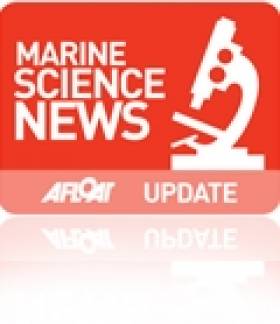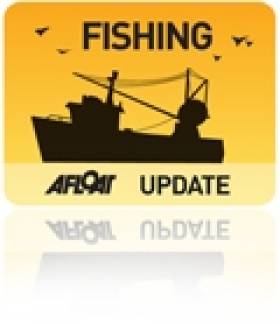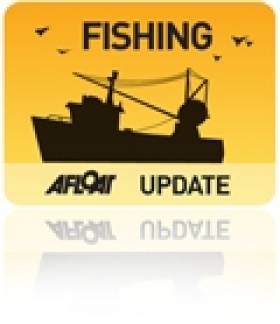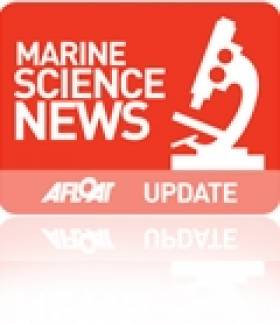Displaying items by tag: Atlas
Irish Scientists Contribute to New World Class Offshore Geological Atlas
marineatlas – #Scientists from the Geological Survey of Ireland and UCD have contributed to a new Geological Atlas of the offshore geology of north-west of Europe, which will be launched today at the Geological Survey of Denmark, Copenhagen. The Atlas and associated database was jointly developed by 8 geological surveys and sponsored by more than a dozen exploration companies at a cost of €4 million, and is expected to result in increased exploration activity and research.
The full name of the Atlas project is the Northeast Atlantic Geoscience Tectonostratigraphic Atlas (NAGTEC) and GSI's involvement grew in partnership the NAG consortium, which is a cooperative framework agreement between the Geological Surveys of Ireland, Northern Ireland, Great Britain, The Netherlands, Germany, Norway, Iceland and Denmark (including Greenland and the Faroe Islands).
This hugely ambitious project began in June 2011, and in its 3 year lifespan has successfully correlated all released offshore data for the entire north-east Atlantic, for the very first time. Using this resource, skilled experts based at the various NAG surveys developed data products, primarily geological maps that detail the development of the North East Atlantic. These maps are now available for scrutiny amongst the NAGTEC Atlas pages, whilst the offshore data is housed in a structured database. It is worth noting that the project, undertaken by the multiple government agencies, was completed on time and on budget and met all targets.
Welcoming the launch, Minster of State at the Department of Communications, Energy and Natural Resources, Joe McHugh TD, pointed out that the long term benefits to Ireland, as a result of participation in NAGTEC are predicted to be significant:
· Datasets can be used by exploration companies to aid exploration.
· The majority of sponsoring companies are not active in Ireland but will now be more aware of Irish opportunities.
· The data will continue to stimulate research on offshore Ireland.
· This project will also highlight data and knowledge gaps for further exploration and research.
· New international research links have been forged between the surveys, which will result in more projects.
The Minster added that " this new data is also very timely in the context of the Atlantic exploration licensing round which was opened this summer and concludes in September 2015."
The Irish contribution to the NAGTEC project was co-ordinated by Maria Judge, INFOMAR Geologist at the Geological Survey of Ireland, and employed technical support from a post-doctoral researcher, Dr Kenneth McDermott, who was based at the School of Geological Sciences, UCD under the supervision of Prof. Pat Shannon. The project was also supported by the Department of Communications, Energy and Natural Resources' Petroleum Affairs Division of Ireland, who permitted access to the released offshore petroleum exploration data, from which much of the data products were generated.
The release of the atlas, to sponsoring companies initially, is timely for Ireland, as it comes after new licensing terms have been recently proposed and a new seismic data gathering exercise is underway, while another offshore licensing round will take place in 2015.
Fishermen & Scientists Meet on Long-Term Fishing Management Plan
#marineatlas – Simon Coveney, T.D., Minister for Agriculture Food and the Marine launched the Marine Institute's Atlas of Commercial Fisheries around Ireland in Dublin today (26th March '14).
The Atlas will be disseminated at a meeting of fishing industry representatives, environmental NGOs and scientists from Ireland, France, UK, Belgium, Portugal and Spain at Dublin Castle today. The meeting, part of the EU funded GEPETO project, will examine case studies on complex management issues associated with mixed fisheries in the Celtic Sea, Bay of Biscay and Iberian waters. The project aims to put in place the building blocks for integrated long-term fisheries management plans at a regional scale.
Minister Coveney welcomed the Atlas saying:
"New policy directions within the reformed Common Fisheries Policy, such as a regionalised approach and discard ban require better information. The Atlas of Commercial Fisheries presents complex data in a very visual way using informative maps, making it accessible to a whole range of stakeholders. It brings a new level of transparency in terms of fishing activities and offers new possibilities in terms of spatial management of mixed fisheries."
A new reformed CFP was agreed last May between Member States and the European Parliament. The agreement was reached after lengthy and complex negotiations under the Irish presidency, led by Minister Simon Coveney.
The Atlas of Commercial Fisheries around Ireland is the second of its kind published by the Marine Institute. It shows the distribution of fishing activities in Irish waters by gear and country. Fishing grounds as well as the distribution of landings for all the main commercial species is also shown at high resolution.
The Atlas has been developed in parallel with an online Atlas of Fisheries over a wider area within the EU funded GEPETO project. Dr. Colm Lordan, Marine Institute, co-author of the Atlas explains: "We can visualise and analyse complex scientific data and models as never before. The main challenge is to communicate the information in a way that is useful and understandable to stakeholders".
"The philosophy behind the GEPETO project is to replace the existing top-down management paradigm with a bottom-up approach in line with the new Common Fisheries Policy which is transparent, evidence based and developed in collaboration with the stakeholders. We have an opportunity to reshape the future of fisheries management and ensure a sustainable resource base and industry for future generations".
The Atlas of Commercial Fisheries around Ireland is available to download free at www.marine.ie or http://hdl.handle.net/10793/958
The Marine Institute and BIM produced the "Discard Atlas" – which is a detailed compendium of discards by the Irish Fleet on a stock by stock and area by area basis. The Atlas also outlines a range of potential measures to help reduce discarding. The "Discard Atlas - scientific observations and potential solutions" was compiled with the support of Irish Industry, to inform the EU wide discard debate, to identify where action needs to be taken and to inform on the appropriate measures.
Commenting on the Atlas Minister Coveney said "Ireland has now taken the lead in the debate on discards and this Atlas will inform the process to achieve real change and a significant reduction in discarding within the new Common Fisheries Policy". Minister Coveney emphasised that "discarding is an EU wide issue, not just an Irish issue. While the Atlas highlights discarding in the Irish fleet, all Member States fishing these stocks, do so at the same time, using similar gears and under the same market conditions. While there may be some differences, overall the discard trends will be similar for all".
In calling for all Member States to publish their figures, the Minister said "I have consistently said that discarding is a complex issue and the debate must be informed by all the scientific facts, so we can better understand the issues and identify potential solutions". The information provided in the Atlas is based on information that is collected by all Member States. However, the international data has not been compiled into an Atlas format. Minister Coveney said " It is only when the full extent of the available international data are compiled can we collectively make informed decisions on a coherent EU wide discard policy, underpinned by a focussed suite of measures to significantly reduce and ultimately eliminate discards. The information contained in the Atlas re-enforces my long held view that we need to tackle the discard problem on a stock by stock and fishery by fishery basis, and not by a blunt simplistic blanket ban which will be difficult to enforce".
The Atlas states that in a review of world discarding, the UN noted that the northeast Atlantic has the second highest discard level in the world, estimated to be 1.3 million tonnes, the majority being attributed to EU fisheries. The extent of discarding varies and where international data are available, the picture is mixed. In the Celtic Sea, international discarding of haddock was 12,400 tonnes (56% by weight) in 2010. In the Irish Sea; an average discard rate of 30% for haddock associated with Irish vessels is in line with other countries. However, there are cases where Ireland makes a very minor contribution to overall international discarding; for example in 2010, 1,183t of Cod was discarded in the North West fishery (area Via), yet Ireland contributed to less than 1% of this.
Minister Coveney said that "I want to commend the Irish industry in their decision to support this project, and acknowledge that they have already been pro-active in bringing forward proposals to reduce discarding of, Cod, Haddock and Whiting in the Celtic Sea. I intend to build on this good work by asking the Irish Fisheries Science Research Partnership (IFSRP) to look at the matter in light of the new Atlas information and explore the possibility of coming forward with further ambitious discard mitigation measure. It is only by this type of cross industry co-operation that a comprehensive set of proposals for dealing with the EU wide discarding problem can be designed and implemented, and I call on other Member States to follow the Irish lead and publish the full details of their discards so that our common goal for the elimination of discards can be realised."
New Marine Atlas Answers Important Questions
This second edition of the Atlas of the North Western Waters is now available for free download here. It has been funded under the EU MEFEPO (Making the European Fisheries Ecosystem Plan Operational) project, made up of ecologists, economists, management experts and fisheries scientists who are trying to make ecosystem-based fisheries management (EBFM) a reality in Europe. EBFM seeks to support the 'three pillars of sustainability' (ecological, social and economic) and as such includes human activity in the ecosystem.
The Atlas is intended for policy makers, managers and interested stakeholders. Its purpose is to provide a broad overview of the ecosystem of the NWW Regional Advisory Council (RAC) area with the science kept as clear and concise as possible and technical language kept to a minimum.
"Next year the European Marine Strategy Framework Directive requires an analysis of the features, pressures and impacts on member states' waters and the reform of the Common Fisheries Policy will put more emphasis on regionalising management," said Dr. Cormac Nolan of the MEFEPO project at the Marine Institute, "so this new edition of the North Western Waters Atlas, and the work of the MEFEPO team behind it, is both timely and valuable."
The first edition of the Atlas, published in 2009, was extremely well received and this 2nd edition has been updated and revised in response to stakeholder feedback. The Atlas provides up-to-date information on the physical and chemical features, habitat types, biological features, birds, mammals, fishing activity and other human activities taking place within the NWW region. There are new chapters on elasmobranchs and mariculture and the hot topic of discarding is covered in more detail. Background material on four NWW fisheries (mackerel, hake, Nephrops and scallop), which have been used as case studies in the MEFEPO project, is also presented.

































































